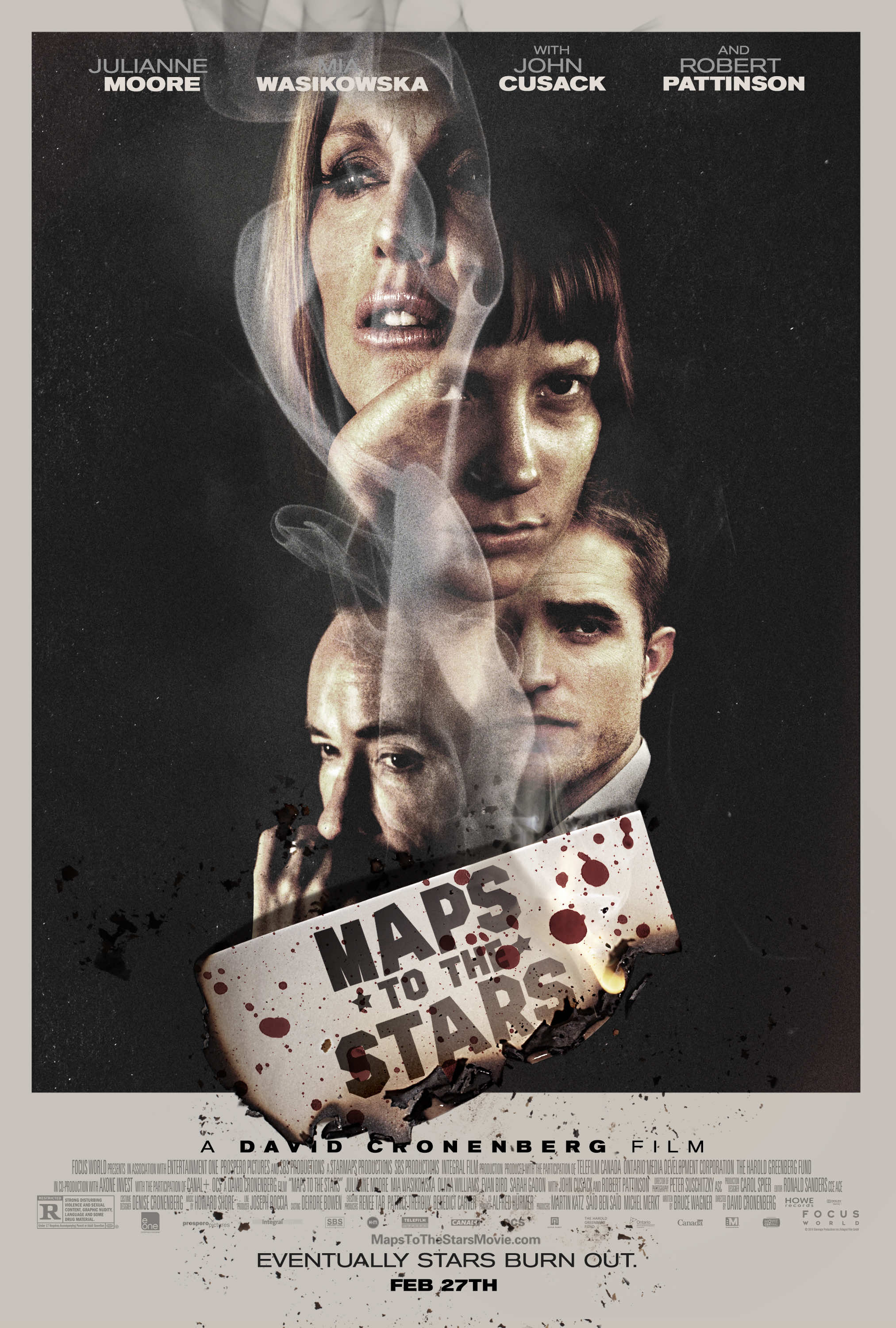 Considering the story of Maps to the Stars, you may be forgiven for questioning David Cronenberg’s feelings toward Tinsel Town. It follows a family of recognizable modern-day Hollywood archetypes. Benjie (Evan Bird) is a bratty 13-year-old child actor fresh out of rehab. His “momager” (Olivia Williams) cares less about the boy’s mental state than his next big paycheck reprising the title role in Bad Babysitter 2. His father, Dr. Stafford Weiss (John Cusack), is a new age guru less involved with his family than his persona as a host of a self-help TV show, “The Hour of Power,” and making house calls to celebrities like Havana Segrand (Julianne Moore) where he practices a form of Reiki mixed with platitudes from the school of Carl Jung.
Considering the story of Maps to the Stars, you may be forgiven for questioning David Cronenberg’s feelings toward Tinsel Town. It follows a family of recognizable modern-day Hollywood archetypes. Benjie (Evan Bird) is a bratty 13-year-old child actor fresh out of rehab. His “momager” (Olivia Williams) cares less about the boy’s mental state than his next big paycheck reprising the title role in Bad Babysitter 2. His father, Dr. Stafford Weiss (John Cusack), is a new age guru less involved with his family than his persona as a host of a self-help TV show, “The Hour of Power,” and making house calls to celebrities like Havana Segrand (Julianne Moore) where he practices a form of Reiki mixed with platitudes from the school of Carl Jung.
Then there’s the ostracized Weiss daughter, 18-year-old Agatha (Mia Wasikowska). Fresh off a bus from Jupiter (Florida), the abandoned older sister has a face deformed by burns from a childhood case of pyromania. She wishes to “make amends” after her release from a mental institution on the other side of the States. Slithering back into the family after taking a job as a “chore whore” for Havana and warming up to a limo driver (Robert Pattinson) who has aspirations to write, direct or act she also rekindles old traumas.
Then you have Carrie Fisher playing herself. Her appearance is more than a bit of stunt casting. In real life, Fisher has had no shame in talking about being a young actress born of Hollywood royalty (singer Eddie Fisher and actress Debbie Reynolds) and its affects on her persona. She’s done it with a similar tone of dark humor that Maps after toys with. She achieved pop culture fame in Star Wars at only 19 years of age. Then, as an adult, she wrote about the dark side of Hollywood success in Postcards From the Edge and Wishful Drinking. There’s something meta-poetic about her being the one who recommends Agatha to Havana as an assistant, after “friending” the young women via Twitter, of all places.
Agatha enters the story as an interloper on fire, playing the acting game at an almost spiritual height that is as disturbing as it is riveting. While everyone struggles to maintain a front in order to find a way to matter, she slithers among the Hollywood inhabitants to get what she wants. She’s viscerally in touch with herself. She becomes — if you can forgive the Jungian reference — a disturbing kind of anti-hero enlightened by fire and her scarred flesh. As in so many other films by Cronenberg, the flesh is essential to the drama. Agatha recites “Liberty” by the great French surrealist poet Paul Éluard a number of times in the film:
On the harmony of the flesh
On the faces of my friends
On each outstretched hand
I write your name
Benjie also recites the poem, revealing a link between brother and sister that could very well threaten the frayed link between their parents. Indeed, it all builds to a disturbing climax that’s one for the Cronenbergian canon. You only wished he had more money for the special effects, but those are the sacrifices of an indie filmmaker. Cronenberg still delivers with his cold framing and the otherworldly delivery of some of Wagner’s dialogue that hums with a “dead inside” malaise from the Weiss family. Except for Agatha, who strides in with bold, creepy purpose that everyone else, so lost in themselves and aspirations, can hardly notice.
Special note should also be given to the always game Moore, who could have very well been nominated for best actress for this role had the film been released earlier, and — more importantly – if Hollywood could dare show as bold a sense of humor as Moore herself. Her character features echoes of Lindsey Lohan. She plays with a bubbly voice and offers a broad range of personal suffering, from passive-aggressiveness to deep sadness that also make Havana sympathetic, even when she’s sitting on a toilet struggling from a backup by Vicodin, reciting a list of chores to Agatha while trying to worm into her mysterious assistant’s personal life.
Though it’s easy to consider the film from Cronenberg’s perspective, it is Maps to the Stars screenwriter Bruce Wagner who brings a broad range of experience from Hollywood to his writing (he’s the man behind Dead Stars and Wild Palms). This was one of the first scripts he wrote as a limo driver in Hollywood on the early ’90s, not unlike the role Pattinson plays in the film. The scenes are loaded with an undercurrent of disdain for the city. The characters are archetypes of the business; charm stands as superficial but underneath there’s almost a psychotic desire for success and recognition that has rotten their souls. It’s blackly funny at times but mostly cringingly disturbing.
It could have easily become a tiresome movie, but Cronenberg has such a light yet effective quality as a director, another layer, hidden beneath the superficial struggle of conflict rustles below, like the flesh gun trying to puncture through the TV screen of Videodrome. That tension arises from Agatha’s unwanted reappearance. It speaks volumes not only about celebrity-obsessed culture but the weight of maintaining false fronts for ulterior gains. Hollywood is the milieu, but greed and the sacrifice of identity and humanity for profit and popularity is the theme. Agatha is the flesh scorned by family and scarred by flames, and she’s here to bring a warped sense of balance to a warped world.
Maps to the Stars runs 111 minutes and is rated R (cursing, violence to the flesh and sexual situations). It opens Friday, Feb. 27, in our South Florida area at O Cinema Wynwood in Miami (where I will introduce the film at 9:15 p.m.) and Cinema Paradiso Fort Lauderdale. The film opened in the U.S. a few days ago and will continue to open across the country. For other screening dates in other parts of the States, visit this link. Focus World provided an on-line screener for the purpose of this review. All images in this article courtesy of Focus World.
Also, read my interview with with Cronenberg in “Cultist,” the art and culture blog of the “Miami New Times” where he shares what he likes about Wasikowska’s acting and more on why “the flesh” is the pinnacle of our beings:
You can read even more of my interview in this blog post:












Excited to see this! I keep checking my flixster and imdb apps to see when it will come to theaters here in st.pete, fl. Thanks for sharing this trailer and your review- it makes me even more interested in how it will all be pulled off.
I checked. Nothing scheduled yet, but keep checking! 🙂
Yep will do!
so it came on on demand and I rented it immediately. It was great! so intriguing and unique. and Julianne Moore was not a let down- is she ever? haha
Great to see that you liked it. It has that wonderful Cronenberg atmosphere. To see Moore in it is amazing. She won best actress at Cannes I believe for it. I heard at least one person in the media in Canada say this is the one she should have won an Oscar for, not Still Alice, but Maps was not released in time, and the film is to harsh on Hollywood to challenge the status quo, and they like actors who play people who are suffering from different kinds of maladies. Havanah’s handicap may have been her ego.
Oh yes definitely. What kept her from moving forward was in part because of her ego. It drove her almost insane. I love how it challenges Hollywood; It speaks out against the status quo and gives viewers food for thought. And it’s true that the Academy loves their handicaps and the mentally ill. I also liked the twist and turns that the film took. I was never bored watching it because I was always wondering what would happen next. Nicely shot and edited as well.
Awesome! If you haven’t seen History of Violence, check that one out.
Ok yea I will! Thanks 🙂